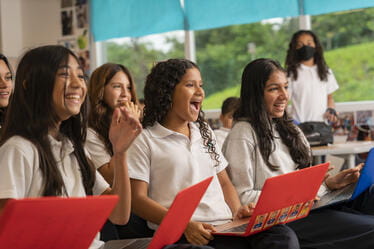We use cookies to improve your online experiences. To learn more and choose your cookies options, please refer to our cookie policy.


In May 2018 the Metropolitan School of Panama's choir performed "Tonadas del Trópico Niño" at the Ernesto J. Castillero National Library. Tonadas del Trópico Niño is a collection of 24 songs published in 1955. The pieces were composed for young voices and piano by renowned Panamanian musician and educator, Gonzalo Brenes.
This project was initiated at the Metropolitan School of Panama by music teacher Juana Ramos through a transdisciplinary project involving literature, visual and performing arts and national studies. Juana regularly teaches her students a wide repertoire of folkloric songs from around the world. In her classroom she emphasizes the role of music as a cultural treasure, and the importance of safeguarding global cultural traditions. Following this line, Brenes' compositions fit her educational goals perfectly.

Ramos, a music teacher, pianist and philologist discovered the "tonadas" in the National Library. Taken away by the collection, she began a profound investigation to develop an outstanding pedagogical project based on the work of this prolific Panamanian artist. Her project began by exploring whether these songs composed in the first half of the 20th century would resound in children exposed to different cultural experiences today, students from a wide range of nationalities whose spanish is not their native tongue. Juana discovered that the students received the world positively, which she attributes to Brenes' flawless selection of poems by Panamanian authors like Rogelio Sinán, Ofelia Hooper and Dora Pérez de Zárate and great poets from Latin America and Spain like Gabriela Mistral, Juana de Ibarburu and Federico García Lorca.
Juana Ramos developed her own methodology, remaining faithful to Brenes' work and intention. She began by a careful selection of songs, most appropriate for each grade not only vocally but in terms of vocabulary. She worked from the most basic unit of language, which is phonetics. Some words include complex phonemes, especially challenging to children whose first language isn't spanish. Brenes' work became ideal for both vocal exploration and language acquisition. The semantics were another area of work, as the vocabulary included folkloric terms, and words of animals and plants from the tropics.
Juana seeked to integrate other disciplines with this project and worked together with fellow teachers Odette Versailles and Sandra Ramírez, teachers at the MET for her students to explore the music and acquire a deeper understanding of the music through drama and visual arts. This approach goes in line with the school's IB curriculum which seeks to develop students integrally through transdisciplinary explorations of concepts.

The Metropolitan School of Panama's young choir has been developing this repertoire for three years and now includes 38 students from 2nd through 4th grade. Being an international school, the group adapts to change each year with the introduction of students from different nationalities united by a common culture based on the love of music and pride for their work. In May 2018 the MET choir was invited to perform Brenes' compositions at the National Library. They performed a total of 14 songs of Brenes - 10 published in volume I of Tonadas del Trópico Niño, and 4 from his unedited work, which Brenes had composed for a volume II and III that remained unpublished. María Majela Brenes, director of the library, proud and confident of the choir's work in direction of Juana Ramos, provided Ramos with the unedited material for her project.
Juana strongly feels that artistic education should be based on emotion, which will allow the child to cultivate a passion for culture. Juana quotes Brenes who states in the book's prologue that it is each child's right not to sing work that hasn't been created for their voices, that doesn't awaken their intelligence and doesn't ignite their heart." In that thought lies each teacher's responsibility to provide children with the best material.
Read more articles published in Panama about the Metropolitan School of Panama's primary school choir and their director Juana Ramos Pino's exploration of the work of Gonzalo Brenes: